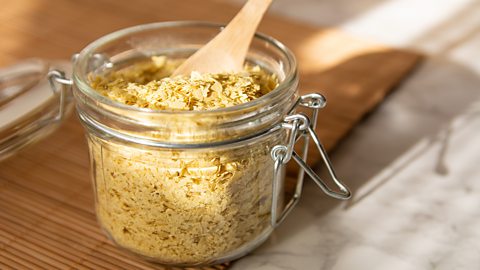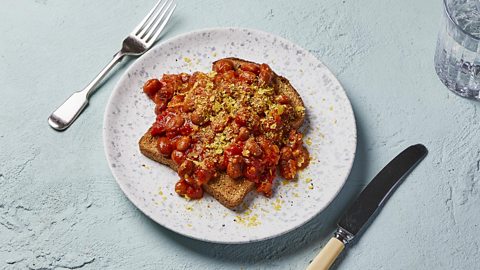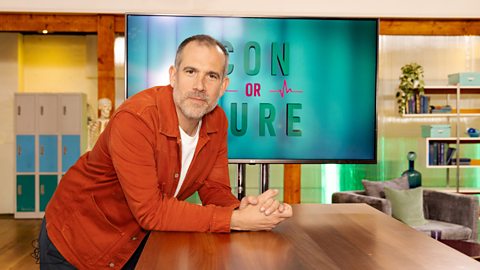What is vitamin B12 and why do we need it?
It’s essential to every cell in the body and a deficiency can lead to neurological problems. Here’s all you need to know about B12, including sources, health benefits and what happens when you aren't getting enough.
By Laura Tilt
Vitamin B12 (also known as cobalamin) is part of the B vitamin family. It’s unique because it’s generally only found in animal foods. So, if you follow a completely plant-based diet, you’ll likely need to supplement or eat foods fortified with vitamin B12 to keep your levels in the healthy range.

What does vitamin B12 do in the body?
Vitamin B12 is essential to every cell in the body because it plays a role in making and repairing DNA. It’s also needed to make healthy red blood cells which carry oxygen around your body, and it ensures the normal functioning of your nervous system.
Over time, a lack of B12 can lead to a type of anaemia where red blood cells become unusually large and can’t carry enough oxygen. Deficiency can also lead to neurological problems like short-term memory loss and difficulties with balance and speech.
Other symptoms of B12 deficiency can include:
- Feeling short of breath
- An inflamed tongue
- Pins and needles (a tingling sensation)
- Blurred vision
- Unexplained fatigue that doesn’t get better with sleep
- Muscle weakness
Related stories
How is B12 absorbed?
Absorbing vitamin B12 from food is a complex process. In food, B12 is bound to proteins and first needs to be freed from this matrix.
This starts in the mouth when B12 is mixed with a protein in saliva called haptocorrin. In the stomach, acid frees the B12, and it attaches to haptocorrin. Another protein, called intrinsic factor, (essential for absorption) is released at the same time.
As B12 leaves the stomach, it lets go of haptocorrin and binds to the intrinsic factor. Together, they travel to the far end of the small intestine, where B12 is absorbed. If any part of this process fails, B12 absorption is affected.
Choose fortified oat milk in this vegan mac and cheese
What causes B12 deficiency?
Pernicious anaemia (an autoimmune condition) is the most common cause of B12 deficiency.
Autoimmune conditions happen when the immune system mistakenly attacks its own tissues. In pernicious anaemia, the immune system destroys the cells in the stomach that make stomach acid and intrinsic factor, which are needed for absorption. Pernicious anaemia affects 0.1% of the population but this increases to 1.9% in older adults aged 60 years and over.
Another common cause is a diet low in vitamin B12. People who follow plant-based diets that include little or no animal foods are at higher risk of this, as vitamin B12 isn’t found naturally in foods such as fruit, vegetables and grains. One study of UK men found that B12 levels were highest in omnivores and lowest in vegans. In another study of UK women, more than a third of vegetarian and vegan women were found to have a B12 deficiency.
Other causes include surgeries or diseases that affect the digestion and absorption of vitamin B12. For example, gastric bypass (a type of weight loss surgery), coeliac disease and Crohn’s disease. Using some medications long term can be a risk factor too. Examples include metformin (used to help manage type 2 diabetes) and proton pump inhibitors (which reduce stomach acid).
Who is most at risk of vitamin B12 deficiency?
People most at risk of vitamin B12 deficiency are:
- Adults over 60 years of age
- People who avoid eggs, meat, and dairy for a long time
- Those who’ve had surgery affecting the stomach or small intestine
- People taking metformin or acid-reducing medication for a long time
What foods contain B12?
Vitamin B12 is almost exclusively found in animal foods, like meat, fish, seafood, eggs, and dairy.
Animals don’t actually produce the B12 themselves, though. Instead, B12 is made by certain bacteria, which enter the food chain when plant-eating animals consume them. The bacteria produce B12 in the animal’s gut which then gets absorbed into their tissues.
Vegan pasta bake
This vegan pasta bake is topped with nutritional yeast for a B12 boost

How can I get enough B12?
In the UK, the recommended intake of vitamin B12 for adults is 1.5 micrograms (μg) per day. This is lower than other European countries, where recommended intakes are set around 4 micrograms per day.
If you regularly eat eggs, dairy and/or meat, the UK guideline intake is easily met with a healthy balanced diet. Two medium eggs contain 2.8 micrograms, a palm-sized piece of meat provides around 3 micrograms.
But if you follow a plant-based diet, you’ll need to include fortified foods like cereals and non-dairy milks and yeast extract and/or nutritional yeast flakes two or three times a day.
Vitamin B12 content of foods
| Food | Serving size | Vitamin B12 content (micrograms) | Recipe ideas |
|---|---|---|---|
| Cow’s milk | 200ml glass | 1.8 | Banana smoothie |
| Beef, lamb, duck | 70 grams/palm sized portion | 2-3 | Slow cooker beef stew |
| Salmon | 100g/deck of cards sized portion | 3 | Teriyaki salmon |
| Yoghurt | 125g pot | 0.7 | Overnight oats |
| Cheese | 30g matchbox size | 0.7 | Macaroni cheese |
| Egg | 1 medium egg | 1.4 | Shakshuka |
| Yeast extract | 8g/1 teaspoon | 1.9 | Spicy baked beans on toast |
| Fortified breakfast cereal (e.g. bran flakes) | 50g bowl | 1.1 | Team your cereal with fortified plant milk or cow's milk |
| Fortified plant milk (e.g. soya) | 200ml glass | 0.8 | Berry smoothie |
| Fortified nutritional yeast | 1 tablespoon | 2.2 | Stems and herbs pesto |
Spicy baked beans on toast
Yeast extract is another great vegan vitamin B12 source

Any tips on supplementing?
Vitamin B12 comes in different forms in supplements. Cyanocobalamin is considered to be the most effective because it can easily be turned into the active form of B12.
Because absorption of vitamin B12 is limited, small and frequent doses are thought to be more beneficial than large, less frequent doses.
Supplemental B12 still needs the help of intrinsic factor to be absorbed, so people with pernicious anaemia are usually given B12 injections.
BDA (The Association of UK Dietitians) recommends that those following a plant-based diet take a supplement of at least 10 micrograms a day.
There is no upper limit for vitamin B12 intakes because no toxic effects have been observed even at high doses, but the NHS recommends no more than 2 milligrams (2000 micrograms) a day.
How can I check my B12 levels?
There are three types of tests which can be used to measure B12 levels. The most common is total B12 or serum cobalamin.
Tests used to measure vitamin B12
- Total B12 (serum cobalamin)
- Active B12 (serum holotranscobalamin)
- MMA (serum methylmalonic acid)
If you have symptoms of a deficiency or you are at increased risk (for example because of a medical condition), you can ask your GP for a test. You can also get at-home testing kits which use a finger prick blood spot. Typically, total B12 will be measured, unless in pregnancy when active B12 is measured.
All content within this article is provided for general information only, and should not be treated as a substitute for the medical advice of your doctor or any other health care professional. Always consult your GP if you’re concerned about your health.
Originally published April 2025.



